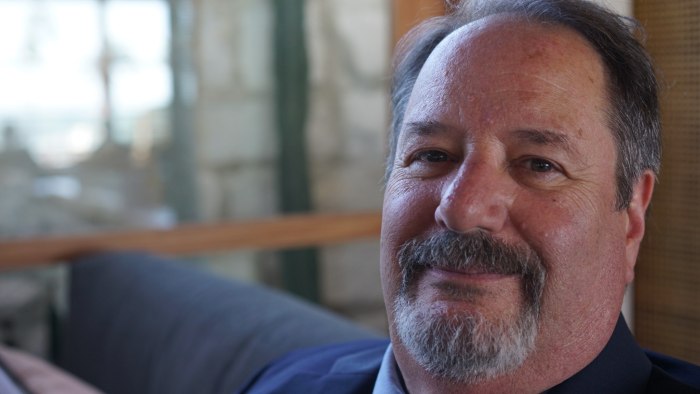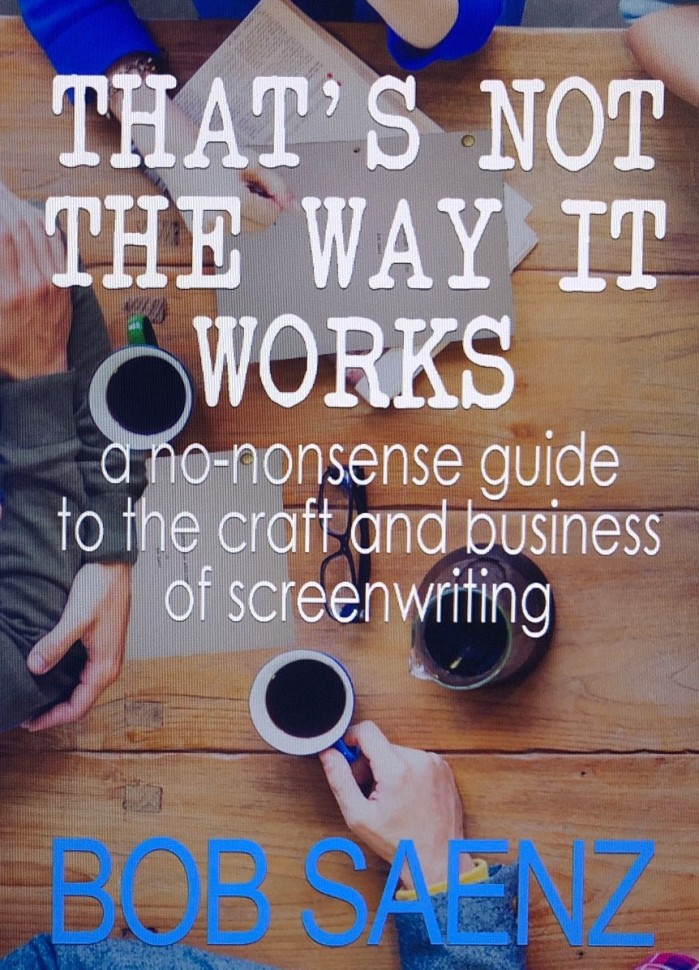

Bob Saenz is a screenwriter, actor and author. His produced works include Hallmark’s Help for the Holidays, Rescuing Madison, Sweet Surrender, On the Twelfth Day of Christmas, Sound of Christmas, The Right Girl, Christmas in Love, the theatrical Church People, and the black comedy thriller Extracurricular Activities. He does rewrites and polishes on film and TV projects for Producers and Production Companies. His screenwriting book THAT’S NOT THE WAY IT WORKS was released in 2019.
His acting roles include a 6-year run recurring character run on the TV show Nash Bridges, Hallmark’s Valley of Light, Francis Ford Coppola’s Jack, David Fincher’s Zodiac, Finn Taylor’s Unleashed, Church People, and The Village Barbershop, among dozens of others. He was a radio DJ on KYCY-FM in San Francisco, played the last 10 years in the 60’s rock band The BSides, and has done voicework on video games, documentaries, and commercials.
Editor’s Note – I’ve had the pleasure of knowing Bob personally for a few years. His insight and advice has proven invaluable to helping me become a better writer, both in terms of craft and career.
What’s the last thing you read or watched that you thought was incredibly well-written?
A spec script by a writer named Rene Gutteridge called Where the Wind Comes. Maybe the best spec I’ve ever read. Just spectacular. Was emotionally affected by it. Stunning.
What was the inspiration/motivation for your book That’s Not The Way It Works?
Two things. One, I’ve been teaching and speaking at writers’ conferences all over the country the last few years and everyone who was there speaking had a book, except me. I complained to my wife about it and she said, “What’s stopping you from writing one?” So I did.
Two, there’s not a single one I could find out there that spoke plainly about the business of being a screenwriter.
With so many screenwriting books out there, what is it about yours that makes it unique?
The tone. It’s conversational. My experience. It’s filled with what I have learned actually succeeding at it. With more than a dozen films produced, I used all that experience to write about what I know. And, I talk first hand about the business of screenwriting. What the writer needs to know about that part of it, which is just as important as writing a script, and how to approach that.
While the first half of the book is about the actual writing of a script, the second half covers the not-as-discussed “what happens AFTER the script is written (i.e. the business aspects)”. What advice would you give to writers who want to learn more about this?
As I say in the book – find out that it’s not easy, it’s not instant gratification, and you have to work at it. Hard. You can succeed; it just takes time and a business plan. I think the book helps with that. Realizing that writing a script is only the beginning of your journey is a BIG eye-opener for most writers who dream of doing this.
Yes, the script needs to be something people would want to choose to see and has to be good, but that’s not the end of it.
The book has a great chapter about dealing with rejection. What are some key takeaways and advice you’d offer to writers?
The main takeaway is that rejection isn’t personal. Producers and reps don’t care enough about you to make it personal. It’s ALL about the content. Whether they love your script and not or can use it at that time or not. There are hundreds of reasons to reject a script… you have zero control and it’s not personal. Even the most famous screenwriters get rejected on a regular basis. It’s an everyday occurrence. You have to learn to live with it or it’ll destroy you.
Another important issue writers tend to overlook is the need to effectively market themselves in addition to their script. While the chapter about what NOT to do is entertaining (and a bit eye-opening), what are your suggestions about what writers SHOULD DO?
Use the avenues that producers and reps have opened to the writer. Querying. Something that is an art unto itself and something I delve into pretty deeply in the book with a whole section on query letters.
Networking. There’s a huge section in the book about this. The dos and don’ts. One thing to always remember about networking: It’s about building relationships, not using people. People who can help you absolutely know the difference and will run away from you if you try and use them.
Contests. The Nicholl and Austin are the ones who will pretty much always get you reads in LA if you final or win them. I’ve had friends get their films made doing well in both of these. Neither are easy to do well in because of the sheer number of entries, but they can pay off.
The last way is through referrals, especially to get a rep. If you know a producer or director or star who will refer you… but again, this goes back to networking and having the great scripts to back it up.
What do you consider the components of a good script?
The most important thing is a great story. It also has to be lean and mean. Brevity and white space are your friend. You aren’t writing a novel. You want just enough in there to have the reader see the film in their head and to be able to fill in what they want to as they read, engaging them in the story that way. Again, a big section in the book about this.
I will say this: Producers are ONLY looking for STORY. Screenwriters can never forget this. Don’t over-complicate the read. You can write a complex story without making it hard to read. Oh… spelling and grammar are important, too.
What are some of the most common screenwriting mistakes you see?
The main one? Choosing the wrong story to tell. Telling a story no one wants to see. Whether it’s not sustainable, not interesting, ridiculous, something that’s been done a thousand times before, something you can see every day in TV reruns… there are a million reasons NOT to write this kind of story. You need to go through a pretty thorough checklist (in the book) and make sure it’s a viable story before you do the time consuming hard work it takes to write a good script. Why do all that hard work on a story that’ll be Dead On Arrival?
Another big mistake I see all the time is writers not doing their research about the topics they choose to write about. Writing things that would never ever happen. You have to ground your script in the reality of the subject matter before you take liberties with it.
What are some key writing guidelines every writer should know?
-AIS – Putting your Ass In the Seat. You have to be disciplined. Producers expect you to be disciplined. Good to start doing that at the beginning.
-Never give up. This is so hard to do, you’ll get discouraged on a regular basis. It’s a lot easier to give up than to stick with it because it takes years to succeed in. Notice I didn’t say it CAN take years, I said it TAKES YEARS, because in every case, it does. You aren’t going to be the exception.
-Don’t cheat on research. Take the time to actually learn about the things you’re writing about. Go out and learn them. A big section in the book about this.
-Again…. for emphasis…. choose a story that is viable for producers and audiences. Don’t just pull something out of the air and write it.
-You’re not writing a novel. Leave everything that isn’t directly hooked to your story or plot points out of your script. One rule of thumb? You know all those people listed in the credits of a film? It’s your job to do everything they don’t. You aren’t a costume designer or a casting agent or set designer…. or… any of them. They don’t ask to write the story, you don’t try and do their job.
You’ve managed to establish and maintain a writing career while living outside of Los Angeles. What are some of the pros and cons about it you’ve experienced?
Pros: I don’t live all that far away (400 miles) and can be at any meeting on a day’s notice, so it’s been fine for me. I am in LA multiple times a year, sometimes for more than a week at a time. It’s expensive… but also my choice. There’s a section is the book about moving to LA and when to pull the trigger and do it if you need to.
Con: I’m not in LA networking all the time. Out of sight, out of mind is a real thing. Not worth moving there for me, though.
Readers of this blog are more than familiar with my love/appreciation of pie. What’s your favorite kind?
Peach. Nothing else comes close.







